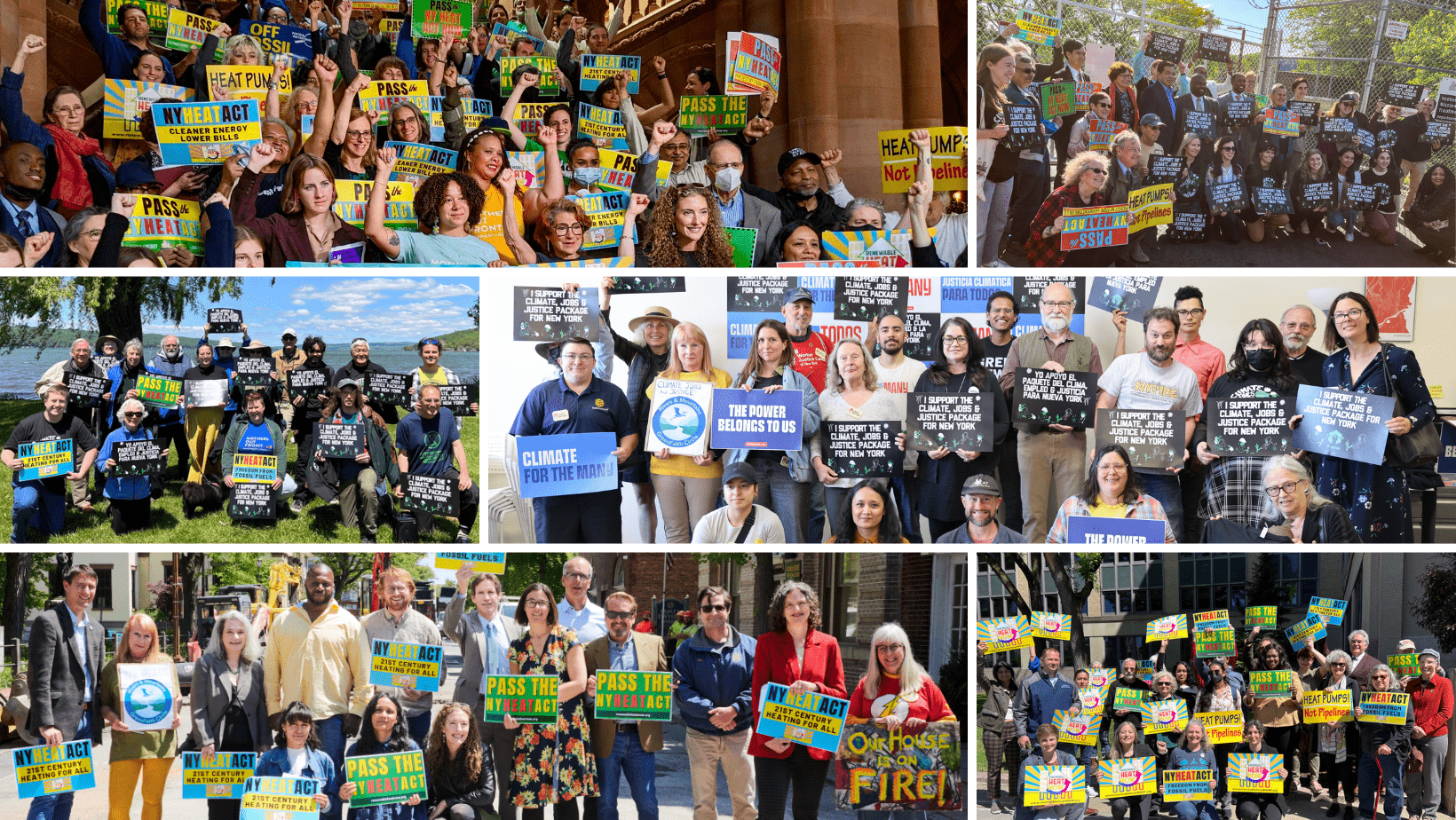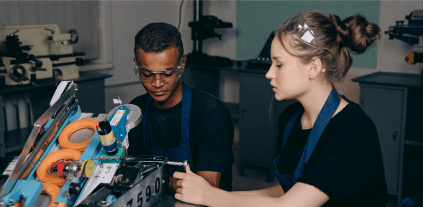


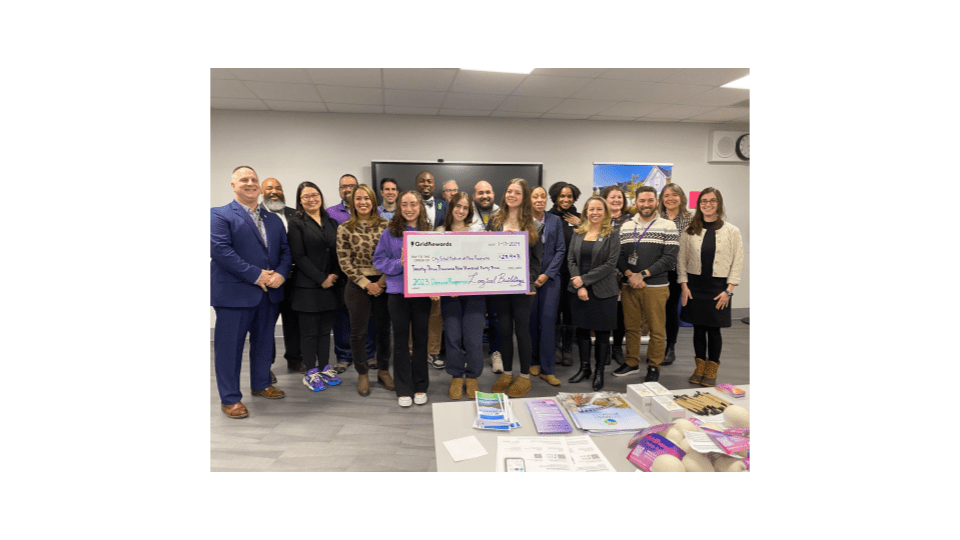
City Schools Receive $23,943 Rebate from Sustainable Westchester and Logical Buildings
for Innovative Efforts to Conserve Energy, Demonstrating Climate Leadership
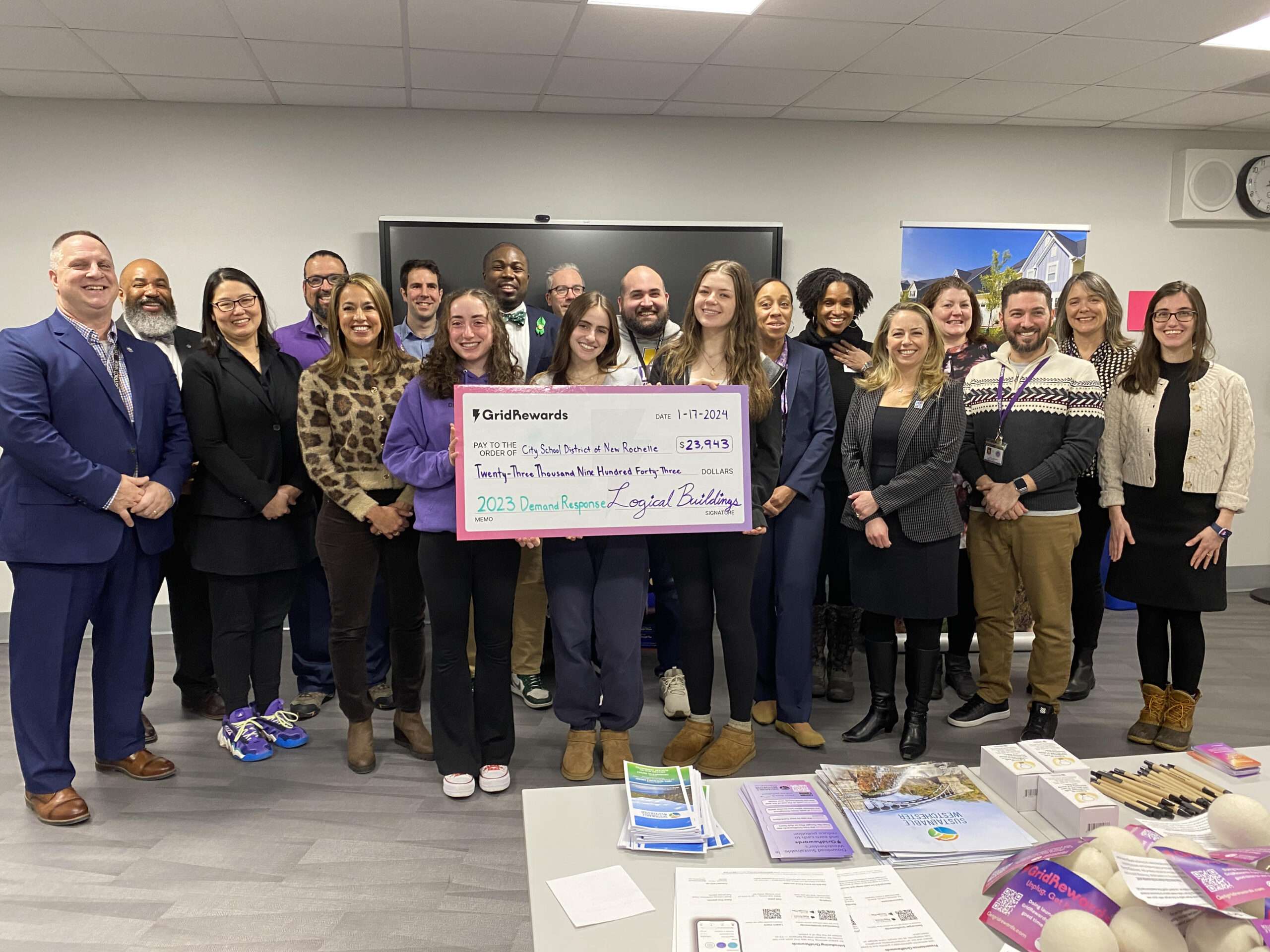
New Rochelle, N.Y. January 22, 2023 – At a celebration at the New Rochelle High School Library on Wednesday, January 17, Sustainable Westchester, a leading advocate striving to make Westchester communities safer and more resilient against the threats posed by climate change, and Logical Buildings, an award-winning climate technology provider, presented the City School District of New Rochelle with a rebate check for $23,943 in recognition of its leadership in reducing energy use among school buildings.
Cooling can be a significant energy challenge for school districts, and amid a rapidly warming planet, there is increasing pressure on buildings – which account for nearly 40 percent of global carbon dioxide emissions – to improve sustainability measures. Pioneering carbon emissions and energy tracking through artificial intelligence, Logical Buildings’ SmartKit AI technology detected peak energy demand at key points during the summer of 2023, and the school district reduced energy usage at five schools by approximately 700 kW, which resulted in $23,943 in savings. New Rochelle is the first school district in New York to participate in Logical Buildings’ Demand Response Program.
City School District of New Rochelle Superintendent Dr. Corey W. Reynolds accepted the $23,943 rebate presented by Lauren Brois, director at Sustainable Westchester, and David Klatt, COO of Logical Buildings.
“Strategically curbing energy consumption during peak times aligns with our school district’s goal of managing resources efficiently and economically. It seamlessly connects with the priority of our Green Schools Committee to reduce the school district’s carbon footprint,” expressed Superintendent Dr. Corey W. Reynolds. “The acknowledgment through this rebate is a testament to our dedication to fostering an environmentally sustainable school district, ensuring a greener future for our students and community alike.”
“By partnering with Sustainable Westchester, the City School District was able to take advantage of an innovative demand response program, earn significant funds and reduce pollution,” said City of New Rochelle Council Member Sara Kaye. “I want to commend the students, the faculty and administrators for their advocacy and taking this important step toward confronting climate change.”
A total of five schools were activated on the platform: New Rochelle High School, Trinity Elementary School, William B. Ward Elementary School, Columbus Elementary School and Albert Leonard Middle School. The program was initiated by the City School District Facilities Department in support of one of the Green Schools Committee’s priorities of developing a comprehensive utility management program that maximizes conservation of natural resources. The district implemented simple measures, like shifting buildings’ cooling schedules and temperature setpoints to reduce energy at key times, and the program remarkably had limited to no impact on students and staff comfort levels. The district is currently exploring opportunities to expand its role by adding additional buildings in summer 2024.
“We have been working with Logical Buildings to bring energy technology solutions to residents, businesses, and municipalities throughout Westchester County, and we are thrilled to be involved in this partnership with the City School District of New Rochelle,” said Lauren Brois, director at Sustainable Westchester. “Enabling this type of technology can help school districts throughout Westchester not only reduce pollution in environmental justice communities, but also earn savings that can have a tremendous impact.”
“As we move towards a more electric and decarbonized world, becoming grid-interactive and using electricity smarter is both critical and valuable to the utility as well as energy users,” said David Klatt, COO of Logical Buildings. “The City School District of New Rochelle is a leader in climate innovation, showcasing the power energy users can have to collectively reduce energy when it matters the most and earning money for it.”
Sustainable Westchester regularly partners with Logical Buildings to offer technology-driven energy savings programs to Westchester County municipalities, residents, and businesses. For example, GridRewards pays consumers to lower their energy consumption during periods of extremely hot weather when people typically crank their air conditioners and electricity demand spikes. More than 4,000 residents and businesses in Westchester County have signed up for GridRewards to date, and on average, each residential user received a direct cash payment of $80, with the top commercial users earning more than $20,000. During the summer of 2022, users’ combined efforts reduced energy consumption by 7MW, enough electricity to instantaneously power 25,000 homes. Con Edison-serviced municipalities, businesses, and residents are all eligible to participate in GridRewards.
School districts interested in learning more about partnerships with Sustainable Westchester and Logical Buildings can contact Lauren Brois, Director at Sustainable Westchester. Contact: [email protected] or 914-242-4725, ext 122.
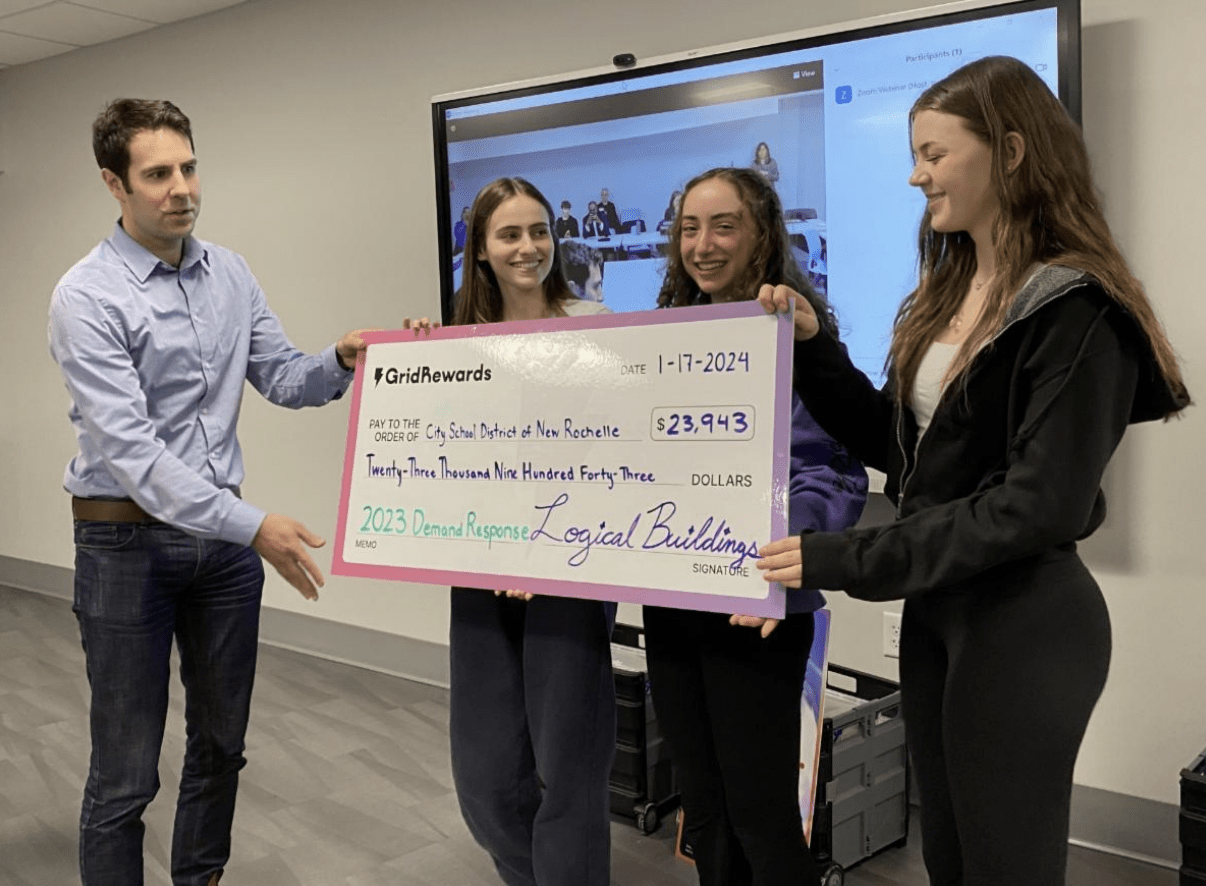
Case Study:
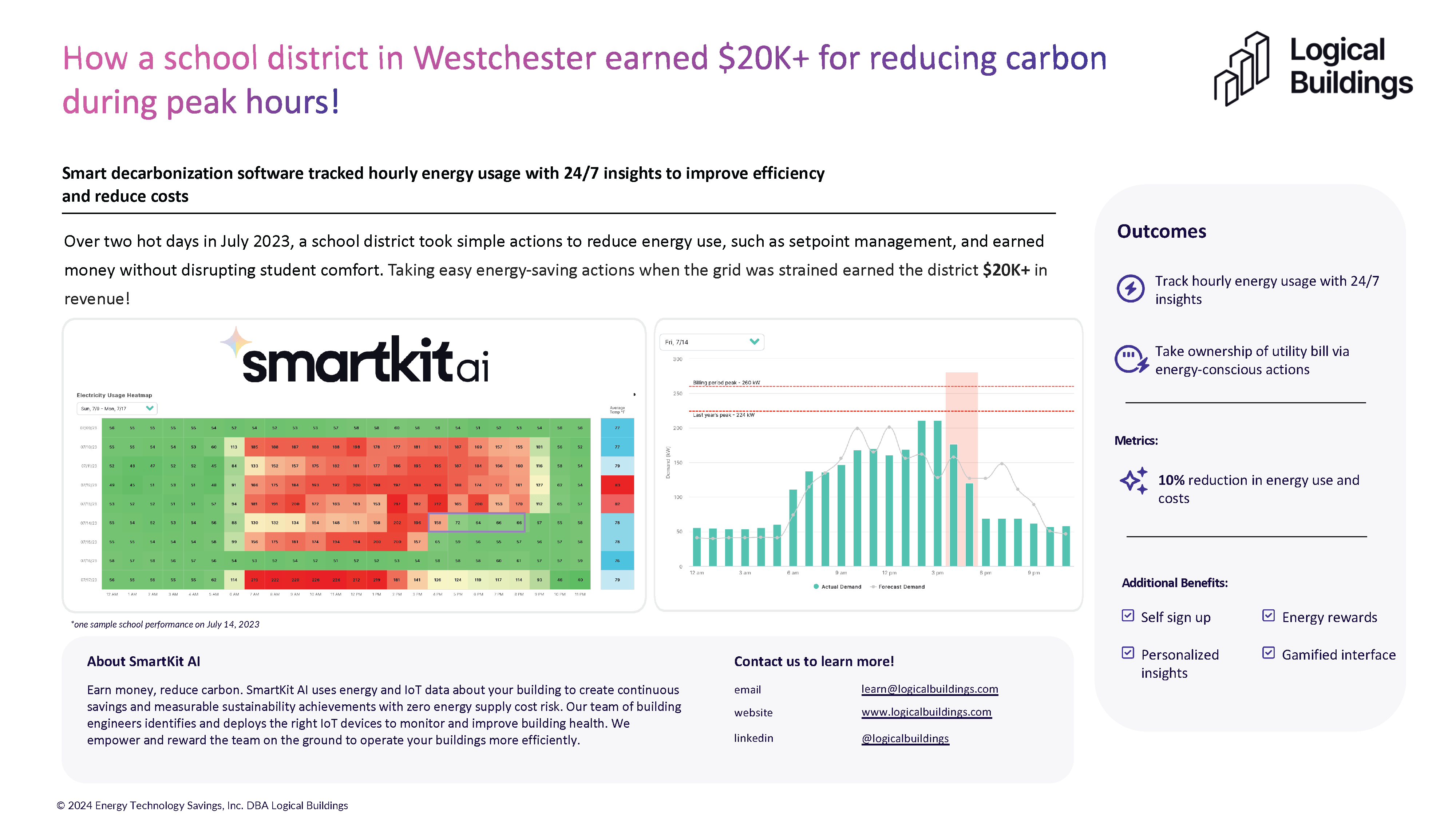
About Sustainable Westchester
Sustainable Westchester is Westchester County’s leading advocate for local municipalities striving to make their communities safer and more resilient against the threats posed by climate change. It plays a critical role in helping members achieve the goals of New York’s landmark Climate Act by supplying large-scale renewable electricity, implementing innovative clean energy solutions, increasing energy efficiency, saving taxpayers money, and promoting equity and environmental justice. Its diverse hub of popular and high-effective programs developed for municipalities includes Westchester Power, Community Solar, EnergySmart Homes, Commercial Clean Heating & Cooling, GridRewards Demand Response, Electric Vehicle (EV) Charging Infrastructure, Zero Waste Recycling, and Sustainable Landscaping.
About Logical Buildings
Logical Buildings is an industry-leading sustainability, smart building, and virtual powerplant software and solutions provider for the built world. Our revolutionary ESG technologies combat climate change by empowering residential, commercial, and industrial energy users to earn money, enhance building health and reduce carbon footprint, all from within user-friendly, award-winning mobile apps. Founded in 2012, the company now operates in major national urban markets, such as New York, Boston, Dallas, Los Angeles, San Francisco, Seattle, Washington, D.C., Camden, Chicago, Miami, and more. To learn more, visit logicalbuildings.com and follow Logical Buildings on LinkedIn.
About the City School District of New Rochelle
With nearly 10,000 students in 10 schools, the City School District of New Rochelle, through an active partnership amongst the community, parents, staff, and students, provides a high-quality and challenging education for every child in a safe, nurturing environment that embraces rich diversity and drives success. Resource Management is one of the CSDNR’s four strategic directions – where we maximize resources and identify operational efficiencies to provide and support the delivery of a high-quality education. Learn more here: nred.org
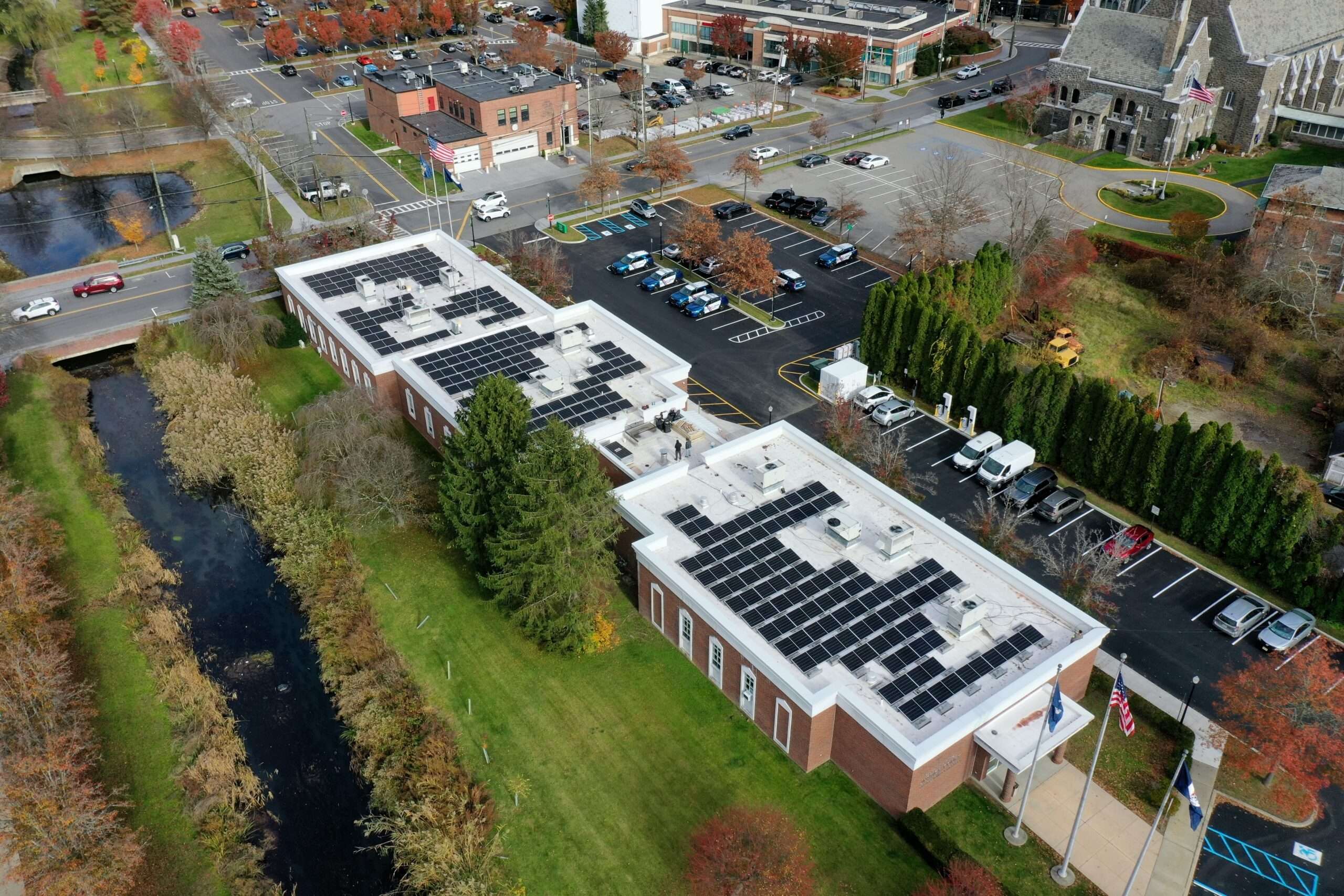

40 Green Street rooftop solar array.
On December 7, 2023, Sustainable Westchester proudly unveiled a new electric vehicle (EV) fast charging station that is demonstrating a first-in-its-kind concept of fast-charging electric vehicles fully from renewable energy, in this case, from solar Photovoltaic (PV). The solar PV arrays and chargers are located on top of 40 Green Street, home to the Sustainable Westchester office as well as the Mount Kisco Police Station, and the Mount Kisco Historical Society.
The project involves a complex system of an 85 kW solar photovoltaic array that captures energy from the sun, stores it into a 180kWh on-site battery, and twin Jule 75 kW DC fast chargers that can charge any kind of electric vehicle with more than 100 miles of range in under 24 minutes. This unique system is thus completely independent from the grid, which ensures that the EV charging at the facility will not operate on fossil fuels derived energy and reduces the impact on the demand on the grid.
The impact of the “Sunshine to EV” project extends well beyond powering EVs: excess electricity generated by the facility is prioritized for low-and moderate-income (LMI) households through Sustainable Westchester’s Community Solar program, which aims to equitably share the benefits of clean energy among historically underserved communities.

Pictured L to R: New York State Senator and Chair of the Senate Environmental Conservation Committee Pete Harckham, Westchester Deputy County Executive Ken Jenkins, NYS Assemblyperson Chris Burdick; Sustainable Westchester Interim Executive Director Jim Kuster; Anthony Fiore, Chief Program Officer, NYSERDA; Mayor Michael Cindrich, Mt Kisco; John Petronella, NYS Department of Environmental Conservation; Peter McCartt, Westchester County Director of Energy & Sustainability; William Serratore, Director of Sustainability, City of Yonkers; Theresa Flora, Mount Kisco Trustee; Michel Delafontaine; Sustainable Westchester Director of Business Development.
A ribbon-cutting ceremony at Sustainable Westchester’s Mount Kisco headquarters was attended by a diverse range of state and local elected officials, the New York State Energy Research and Development Authority (NYSERDA), the New York State Department of Environmental Conservation, EV charger manufacturer Jule, Con Edison, renewable energy industry leaders and environmental advocates.
The cutting-edge initiative proves the possibility for this charging concept to be replicated throughout New York in service of the State’s visionary climate, clean energy, and environmental justice goals. The system was partially funded by a $250,000 grant through the New York State Department of Environmental Conservation Zero Emission Vehicle Infrastructure program, and also supported by the North American EV charger manufacturer Jule. The effort builds on recent progress to expand EV charging infrastructure in Westchester County, including the addition of 90 new stations by the City of Yonkers in April 2023, and 34 new stations by the Village of Tuckahoe.
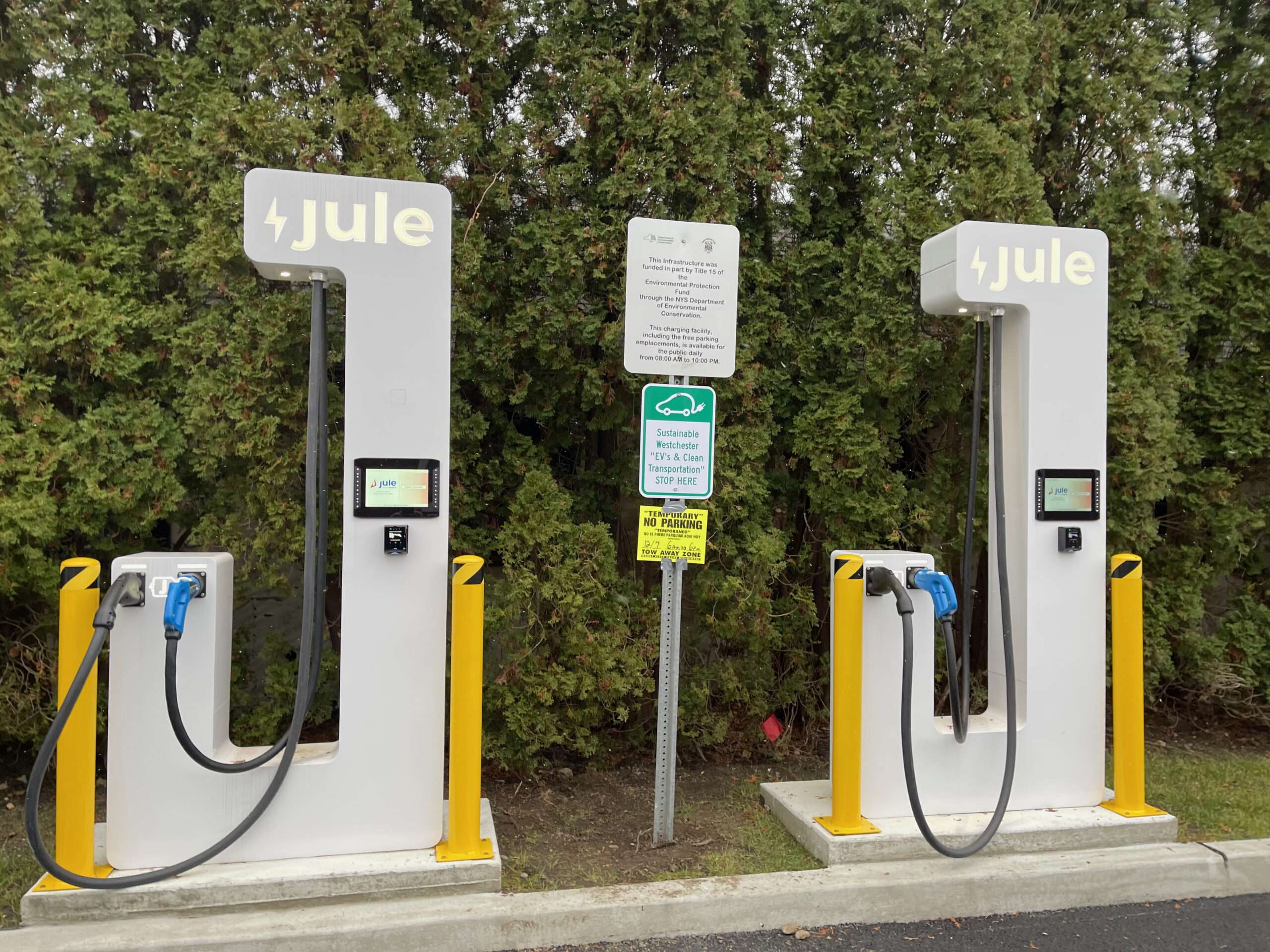
75 kW DC Jule fast chargers
Read more in our featured article about NYCEEC’s participation in Sunshine-to-EV:

Authored By: Molly Levitt
Nothing embodies reduce, reuse, recycle more than a Repair Cafe!

On Saturday May 20th, three of our high school senior interns (including yours truly) went to the Ossining event to promote Sustainable Westchester programs that directly help local residents. The interns met wonderful people from all over the local community and had the chance to provide valuable information about our Grid Rewards, Energy Smart Homes, and Community Solar programs to homeowners, interested citizens, and people doing work for local sustainable businesses.
For the uninitiated, a Repair Cafe is an event where anyone with a broken item can come and take advantage of the expertise of other members of their community to get it fixed. Not only is this a great way to reduce waste by extending the life of items instead of just throwing them away, it also brings the community together in a very unique way. Repair Cafe Hudson Valley has facilitated and hosted repair cafes across the region for ten years and was even recently featured in the Earth Day segment on the Today Show. You can watch that segment here.
The organizer of this Repair Cafe, Michele Stone, explains how she came to get involved in this work: “After the 2016 election, I wanted to use my energy for something positive, practical, and community building.The election brought about much activism and mine was the Green Ossining Repair Cafe. I saw a promotion for a Repair Cafe in New Paltz and visited at the first opportunity. I was so inspired by all the volunteers with the leadership of John Wackman, a legend among the Hudson Valley Repair Cafes!”
Ms. Stone went to Green Ossining, a dedicated volunteer committee. They were happy to sponsor the first Repair Cafe in June of 2017, and there have been over 20 well-attended events since. Michele tells us, “It is gratifying to see community members leave not only with their items repaired, but with a sense of community and the feeling that there is still so much neighborly goodness in our world.”
Personally, this intern loved to talk to people one-on-one and not just give them information, but listen to their stories and learn from them. I will definitely be coming back to more Repair Cafes in the future.
Now, let’s hear directly from our other two interns in attendance about their experience!
From our intern Talia: “Repair Cafe is an incredible way to conserve resources and learn about daily sustainable practices. It is great that people are helping others repair things with their varying areas of expertise. The Cafe’s strong sense of community is truly inspiring, as we cannot make systemic improvements without working together and teaching each other. Personally, I learned a lot throughout the Cafe, whether that be how to change a watch battery, how to use a sewing machine, or how to tune a guitar– all of which I am excited to incorporate into my daily life. “
From our intern Jada: “The Ossining Repair Cafe was an awesome community event that emphasized the overlap between sustainability and community. People gathered for repairs of all kinds, for example, Virginia, an Ossining resident, helped and taught me how to mend the sleeve of one of my favorite sweatshirts.”
Do you want to check out a repair cafe or even organize one in your town? Head over to http://www.repaircafehv.org/ to check when and where your next local repair cafe is and to learn more!


Members of the Mid Hudson Regional Clean Energy Hub.
In 2022, New York State awarded $52 million to establish 12 Regional Clean Energy Hubs throughout the state, which serve as centers of outreach, awareness, and education that help foster residents’ participation, especially those in underserved or otherwise disadvantaged communities, in New York’s clean energy transition.
In its first year, the Mid-Hudson Regional Clean Energy Hub (under the name Smart Energy Choices – Mid-Hudson) has assembled a team of 16 members across nine organizations to serve the seven-county Mid-Hudson region, covering Dutchess, Putnam, Westchester, Rockland, Sullivan, Orange, and Ulster Counties. Energy Advisors located in each county are available to help renters, homeowners, small businesses, and nonprofits navigate the programs and resources available to them to reduce their energy burden. Importantly, Energy Advisors are educators and not salespeople. Their goal is to help utility customers make informed energy decisions based on their unique needs. Read on to see our one-year impact report.
“Everybody is hurting from higher energy costs. But not a lot of people know what exactly to do about it,” said Frankie Lede, an Energy Advisor based in Rockland County. “As an Energy Advisor within the Clean Energy Hub, I can be an educator or a resource for helping people address their energy issues. That is my motivation for doing my job.”
“It’s the human ecology aspect of the work that I can be most helpful,” said Mike Murphy, an Energy Advisor based in Ulster County. “I enjoy helping people navigate some of the complex programs that are available so that they can find comfort in their own homes and not have to suffer energy insecurity, and also help the planet too, so that their children and their children’s children might have a place to thrive.”
In the program’s first year, Energy Advisors provided direct education to over 5,500 individuals through participation in 183 in-person and virtual events, and counseled over 600 households on clean energy programs. After talking with an Energy Advisor, one in three households acted on an energy program or project, 36% of which were connected with low-income programs and wrap-around services.
“We are working hard to increase our services to those households with the highest energy burdens,” said Collin Adkins, Co-Director for the Mid-Hudson Regional Clean Energy Hub. A home’s energy burden is the proportion of total household income spent on energy. “Forty-two percent of our neighbors are considered low-to-moderate income. It’s far too common for these families to be spending 20% or more of their income, just to pay their utility bills.”
Smart Energy Choices – Mid-Hudson is proud to be working with Sustainable Westchester to provide outreach and education throughout Westchester County. “Sustainable Westchester is able to help people from soup to nuts. We’ve got a list of recommended contractors, and we’re able to walk people through which technologies may be best for them. We try to help at every stage, provide information about the rebates, help narrow down the list of contractors, and also share the stories of the successful installations and neighbors that are happy with their projects,” said Sustainable Westchester’s EnergySmart Homes Director, Lauren Brois.
Lauren Kroell, also of Sustainable Westchester, said “There’s no problem that I feel isn’t solvable. … Whatever I can do, even if there’s not a lot that we can accomplish in the moment or at that specific time period, I want to emphasize that we’re always here to see what we can do, and I’m always eager to explore new potential options as well.”
“I was able to use some of [NYSERDA’s] programs, and I thought they were great. And when I found out that [Cornell Cooperative Extension] was hiring, and they needed help reaching out to the low- to moderate-income demographic, especially the Spanish speaking demographic, I thought it’d be a good fit. And I’ve always been in that sustainable world and being able to reduce my carbon footprint, so that was very attractive for me,” said Fernando Ahumada, an Energy Advisor based in Orange County.
On workforce development initiatives, NYCP’s Education and Careers Coordinator Cal Trumann, said “There’s lots of people doing good work, but they’re pretty siloed. And so, my hope is to provide resources to contractors, to new businesses, to workers, to community organizations who try and support workers, but also to provide a network of some sort. That is what I’m excited about, trying to get people into these jobs, make sure they know about them, make sure the jobs are good.”
Interested households can connect with their local Energy Advisor by calling the Mid-Hudson Energy Hotline at 845-605-0580, email [email protected], or fill out our intake form at MidHudsonEnergyChoices.org.
Westchester residents can reach out to Sustainable Westchester’s EnergySmart Homes team by calling 914024204725 ext.122 or emailing [email protected].
Expanding Opportunities in the Clean Energy Workforce
In addition to the services offered by the Energy Advisors, Smart Energy Choices – Mid-Hudson is also thrilled to be working with New Yorkers for Clean Power (NYCP) to increase diversity and opportunities in the clean energy workforce in the Hudson Valley.
NYCP and Smart Energy Choices – Mid-Hudson recently co-launched a statewide coalition called Clean Energy Careers New York, which aims to help residents learn more about the green economy and give them the tools they need to join it. NYCP’s Education and Careers Coordinator, Cal Trumann, has already helped organize several career summits under this effort so far, with a special focus on racial, gender and economic equity.
“There’s lots of people doing good work, but they’re pretty siloed,” said Cal. “And so, my hope is to provide resources to contractors, to new businesses, to workers, to community organizations who try and support workers, but also to provide a network of some sort. That is what I’m excited about, trying to get people into these jobs, make sure they know about them, make sure the jobs are good.”
As New York’s energy transition accelerates, residents, businesses and communities across the State will have access to new opportunities to benefit from the clean energy economy including clean energy careers, home improvements, even rebates for businesses and personal transportation. NYCP is working with Smart Energy Choices – Mid-Hudson to build upon New York’s clean job pathway and expand outreach and resources on clean energy jobs. Together their efforts to help communities access programs to lower their energy burden and grow local clean energy careers is an ideal pairing of services.
Regional Needs Assessment
Despite some early successes, the Hudson Valley’s energy transition presents many obstacles, particularly for low-income and underserved communities. Forty-two percent of census tracts in the region have been classified by New York’s Climate Justice Working Group as “Disadvantaged Communities,” based on their environmental burden and climate change risk, population characteristics, and health vulnerabilities. The region is often noted for its historic yet energy-inefficient building stock, 59% of which was built before 1970, and electricity costs in the Mid-Hudson Region are higher than average utility prices relative to N.Y. and U.S. averages.
“We are working hard to increase our services to those households with the highest energy burdens,” said Collin Adkins, Co-Director for the Mid-Hudson Regional Clean Energy Hub. A home’s energy burden is the proportion of total household income spent on energy. “Forty-two percent of our neighbors are considered low-to-moderate income. It’s far too common for these families to be spending 20% or more of their income, just to pay their utility bills.”
In early 2024, Smart Energy Choices – Mid-Hudson will be hosting a series of public forums to engage disadvantaged communities in a regional needs assessment that will help direct the efforts of the program. With our underserved communities’ participation, the Hub will develop an Equitable Engagement Plan that will determine the strategic priorities for $250,000 in community campaign support and $300,000 in pilot project funding.
“Growing up in an area that’s heavily involved in the clean energy transition, and seeing the disparities between income, it’s made very clear who’s able to be involved in the clean energy transition. So, it’s important to be able to create that equity [regarding] who benefits from the funding,” said Amanda Catale, an Energy Advisor based in Putnam County.
“I just love helping people and making a difference in their lives by connecting them with resources that they sometimes desperately need,” said Faith Laudano, an Energy Advisor based in Dutchess County.
Awareness of programs and resources alone isn’t going to help New York meet its energy targets. Research consistently shows there are barriers to enrolling in programs, economic obstacles, difficulty during installations, and an excess of misconceptions that prevent people from realizing the full benefits of clean energy investments. In order to design their outreach and engagement to specifically address the many barriers that can arise, Smart Energy Choices – Mid-Hudson is partnering with the Consensus Building Institute (CBI) to complete a regional needs assessment in coordination with the communities they serve.
“So many factors pose challenges for communities’ access to clean energy. At CBI, we coordinate efforts to understand and solve such multi-dimensional problems, and this regional needs assessment is precisely that kind of project,” said Melanie Gárate, Senior Associate, Consensus Building Institute (CBI). “I’m eager to help these communities find a way forward and address barriers, by doing targeted, intentional outreach to local leaders and residents.”

Mid Hudson Clean Energy Hub, Year 1 Impact Report.
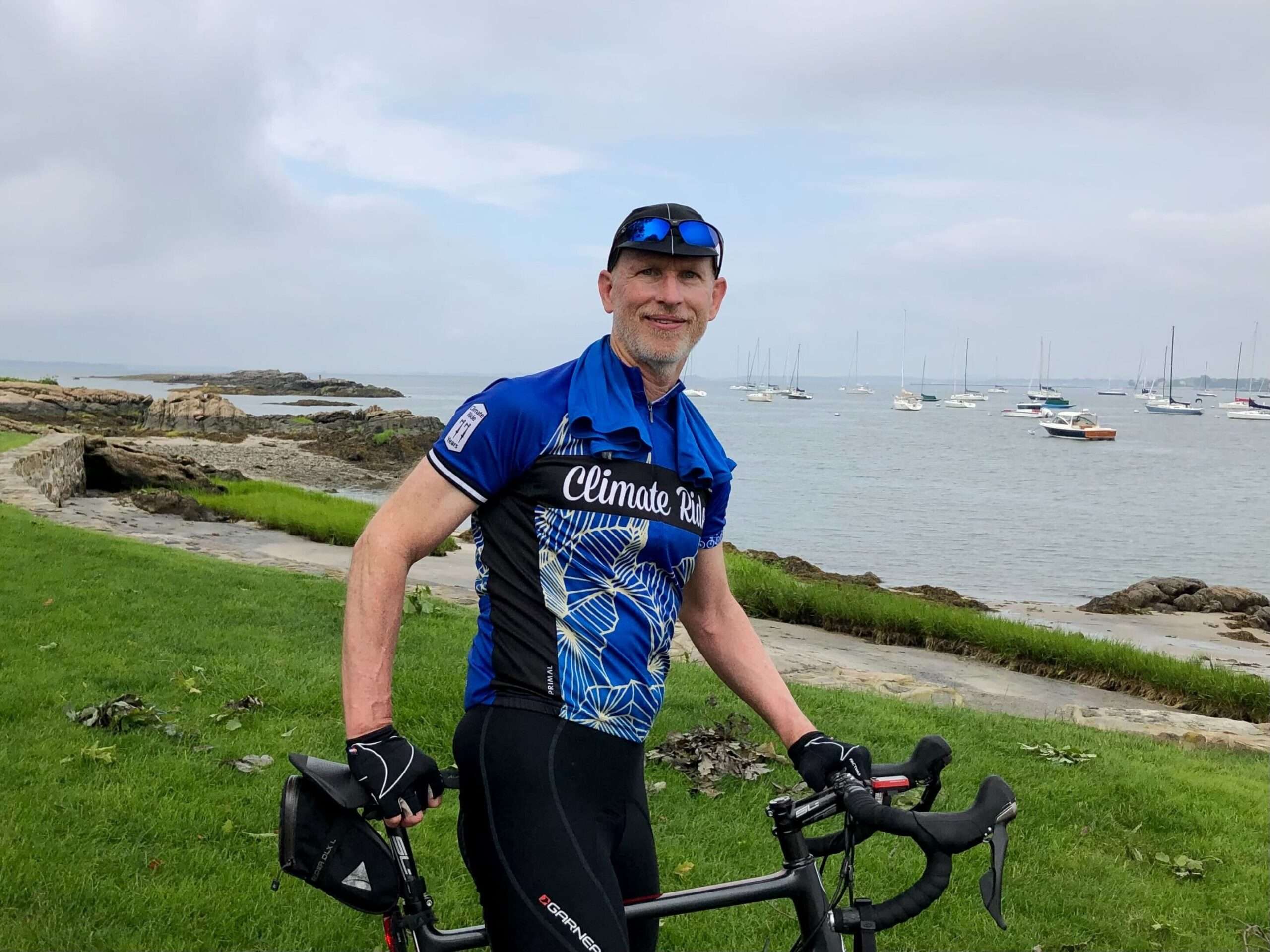
Sustainable Westchester’s Interim Executive Director Jim Kuster is fundraising for Sustainable Westchester with Climate Ride! He will be riding from Burlington VT to Bar Harbor ME, covering 410 miles in 5 days.
Consider sponsoring the ride! Your donation will be matched 4x, so a $10 donation becomes $40! Funds will be used to expand Environmental Justice initiatives at Sustainable Westchester and support our programming.
Read on for a note from Jim on why he Climate Rides!
“My motivation to get on my bike and ride beyond my comfort zone for a purpose beyond myself – addressing climate change – started in 2006, when I noticed the national conversation around sustainability and environmental protection becoming highly politicized. As a result, I started to look for ways to raise awareness to benefit local communities without a partisan objective. I began participating regularly in charity cycling events to connect directly with organizations that put resources to work for locally based climate action. This combined my love for outdoor travel and physical fitness, and opened the door to new relationships, communities and opportunities.
In 2016, I found my way to Climate Ride, a nonprofit organization that arranges amazing events on behalf of other environmentally focused nonprofits and have ridden in more than a dozen fundraising events since then. Sustainable Westchester is now a designated beneficiary of Climate Ride.
Currently I am fundraising for a Climate Ride in September from Burlington VT to Bar Harbor ME, 410 miles. Each dollar donated to my ride will be matched by a foundation associated with Climate Ride, then donated to Sustainable Westchester. In turn, Sustainable Westchester has a matching grant in place, so donations to the event will be multiplied four-fold!
Efforts to combat climate change should be truly non-partisan, but as I have learned since, it’s complicated. Genuine interest in protecting human health, community health and environmental health can lead to difficult policy choices and resource allocation. That is why Sustainable Westchester is ideally positioned to assist its municipal members and their constituents. Our consortium reflects the power of local communities to decide what programs are best suited to them and best effectuate change.
Please donate here to Sustainable Westchester through my Climate Ride event. Thank you!” -Jim
About Climate Ride
Climate Ride is a 501(c)(3) nonprofit organization that organizes life-changing charitable cycling, hiking, running, and other outdoor adventures to raise awareness and support sustainability, active transportation, and environmental causes. Since 2008, their biking, hiking, and running events have raised over $10 million to support climate, clean energy, conservation, and bicycle/pedestrian advocacy grantees. Over 6,000 people have participated in Climate Ride events since 2008. You can find more information https://www.climateride.org/.
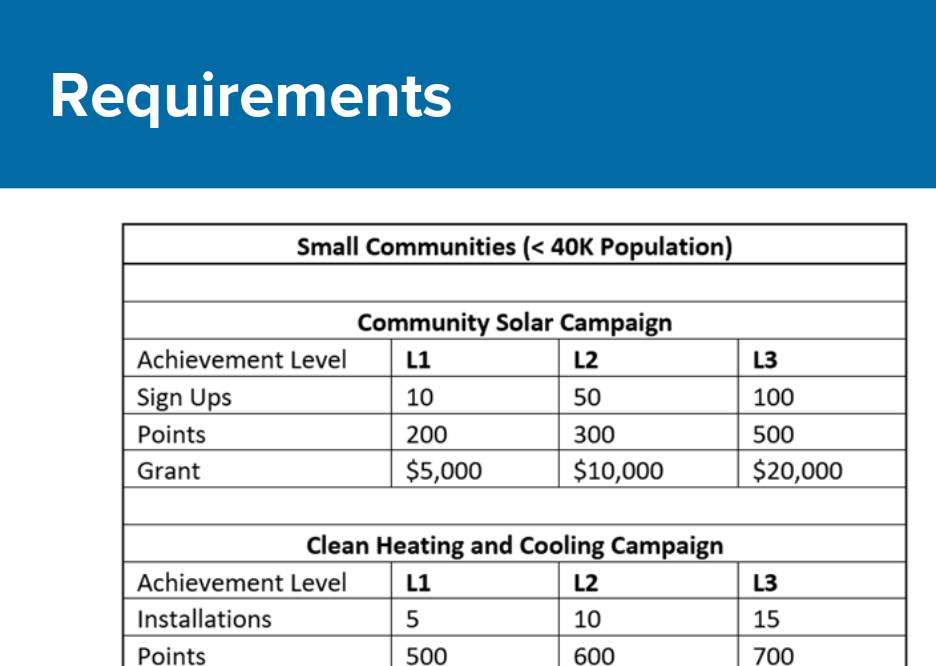
Many local municipalities and sustainability committees tuned into the Clean Energy Communities (CEC) 2023 Program Update Meeting. If you missed the meeting or would like to review the content, this blog post is for you.
During the webinar on August 10th, the Hudson Valley Regional Council provided an overview of the CEC Campaign Guidelines and Sustainable Westchester explained how our EnergySmart Homes and Solar Programs can support your municipality’s Clean Heating and Cooling (Heat Pump) and Community Solar campaign efforts. Municipal representatives also shared their experiences and best practices learned during their CEC Campaigns.
Funding for the Clean Energy Communities program has been expanded. With the new Achievement Levels, communities can earn up to 3,800 points and $97,500 and $290,000 for small and large communities, respectively. Municipalities that have previously completed campaigns are eligible for new funding opportunities. Please refer to the image provided for a breakdown of each campaign type and tier.
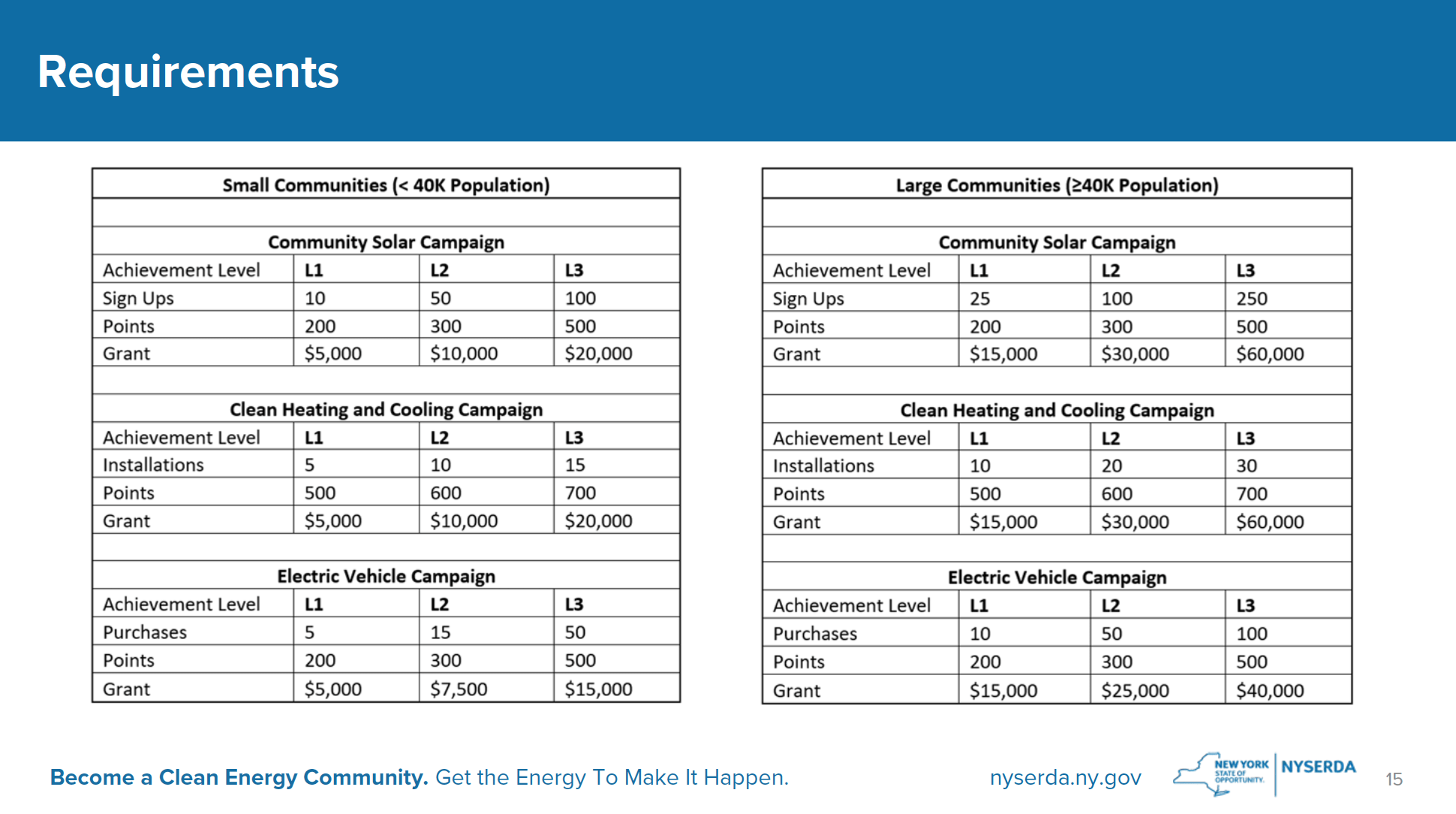
Sustainable Westchester can be your municipality’s partner in offering CEC Community Campaigns. To learn more about these campaign review the materials below:
Quick Link for CEC resources:
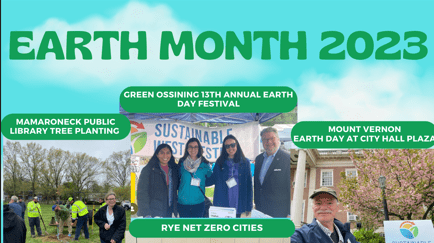
This Earth Day, Sustainable Westchester had the honor of participating in events with numerous member municipalities around the County. Local communities in Westchester held well-attended festivals, clean ups, and educational events. We thank them for the opportunity to be involved with these events and look forward to many more.
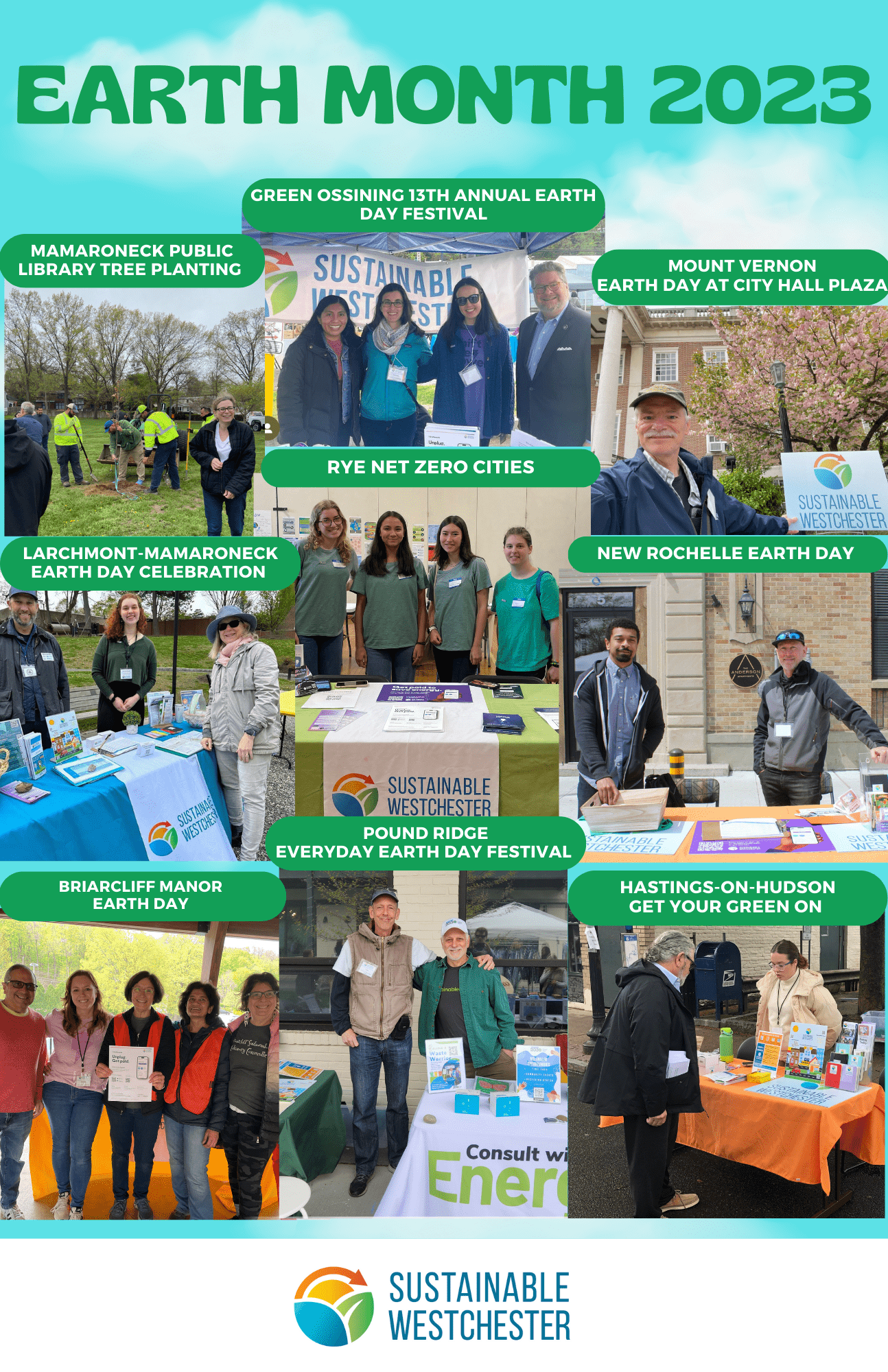
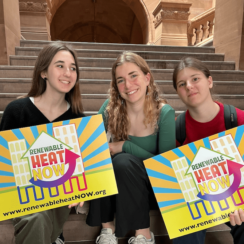
Authored By: Molly Levitt, Sustainable Westchester Intern
On Tuesday, May 23rd, proponents of the NY Home Energy Affordable Transition (HEAT) Act came from all over the state to voice their support in Albany. Three of our very own from Sustainable Westchester made the journey to aid in the effort to pass this important bill.
The NY HEAT Act is a landmark piece of legislation which will help shift New York State away from its reliance on oil and natural gas, and provide relief for residents struggling with the rising cost of energy. It ends subsidies for natural gas such as the “100 Foot Rule”, which requires utility companies to hook up customers to natural gas with no cost if they live within 100 feet of an existing gas main. It also retires old gas grids that are no longer necessary and empowers utility companies to replace them with zero-emission options. These measures will save energy customers $200 million per year in their energy bills. This bill supports zero-emissions forms of heating energy such as heat pumps, geothermal energy, and thermal energy networks, that don’t release dangerous pollutants and are safer for our communities. The bill will make sure to support the transition every step of the way so that jobs are not only preserved, but created.
The “HEAT” in NY HEAT stands for Home Energy Affordable Transition. Keeping true to the name, this law will cap home energy bills for low- and moderate-income New Yorkers at 6% of their annual household income, providing much-needed relief for these families. Between the rate cap and the moratorium on unnecessary support for outdated oil and gas systems, New Yokers for Clean Power (NYCP) estimates that the typical New Yorker will save as much as $75 a month on their energy bills.
Right now is a crucial time for this legislation. New York State just recently passed the 2023 budget, in which we saw some big wins for the environment. For instance, the new budget includes the All-Electric Buildings Act, which bans the use of fossil fuels in new buildings built in New York state. However, NY HEAT didn’t make it through to the final budget, which means the future of this bill has not been decided. There are only a few weeks left in this year’s legislative session. Time is running out to impact the upcoming year’s budget and legislative priorities.
Many elected officials from both houses of the state government who have sponsored or co sponsored NY HEAT spoke in front of the crowd. In fact, many of our own representatives from Westchester have supported this bill. Representatives Dana Levenberg, Chris Burdick, Maryjane Shimsky, Amy Paulin, and Steven Otis co sponsored the bill in the State Assembly. Senators Pete Harckham and Shelley Mayer co-sponsored the bill in the NY Senate. Additionally, among the demonstrators were many leaders from community-based organizations such as Mothers Out Front and No NBK Pipeline, an organization in Brooklyn that successfully blocked National Grid from building two new fracked gas vaporizers in environmental justice communities in Brooklyn.
Our Sustainable Westchester interns were part of this great demonstration. Afterwards, they met with elected officials who have cosponsored the bill package we are advocating for to personally thank them and ensure their continued support going forward. In fact, as the interns made their rounds, many of the representatives they tried to meet with were already on the floor, lending their voices to help pass NY HEAT.
NY HEAT is a vital, trailblazing piece of legislation that will put our state on the right path to carbon neutrality, safer communities, and affordability. We once again would like to shout out the other nonprofit organizations supporting NY HEAT and to all the assemblymen and senators co sponsoring the bill. Stay tuned for more updates on NY HEAT!

Three of our high school interns sitting on the Million-Dollar Staircase in the Legislative Office Building just after the rally for NY Heat. After this, they headed out to talk with elected officials. From left to right: Molly Levitt (yours truly!), Talia London, Jada Fleiss.
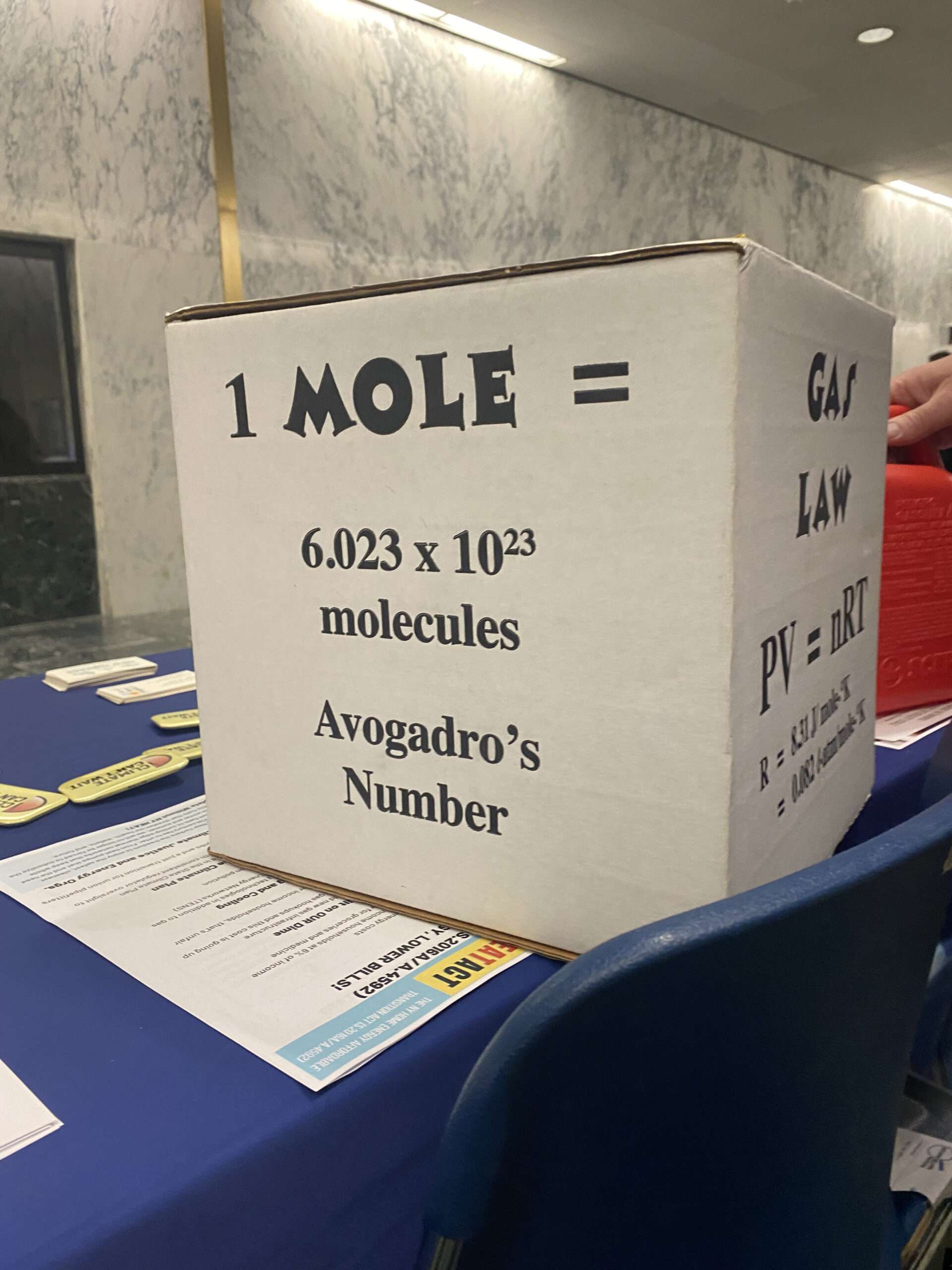
You may remember this unit of measurement – the mole – from your high school chemistry class. This is what one mole of a gas looks like. Did you know that your gas-powered car releases 200 moles of carbon dioxide and 10 moles of dangerous carbon monoxide into the air for every mile you travel? Thank you to the folks in Albany for this powerful demonstration of the effects of gas-powered vehicles. If you are able to, consider making the switch to electric, and walk and take public transit whenever you can!
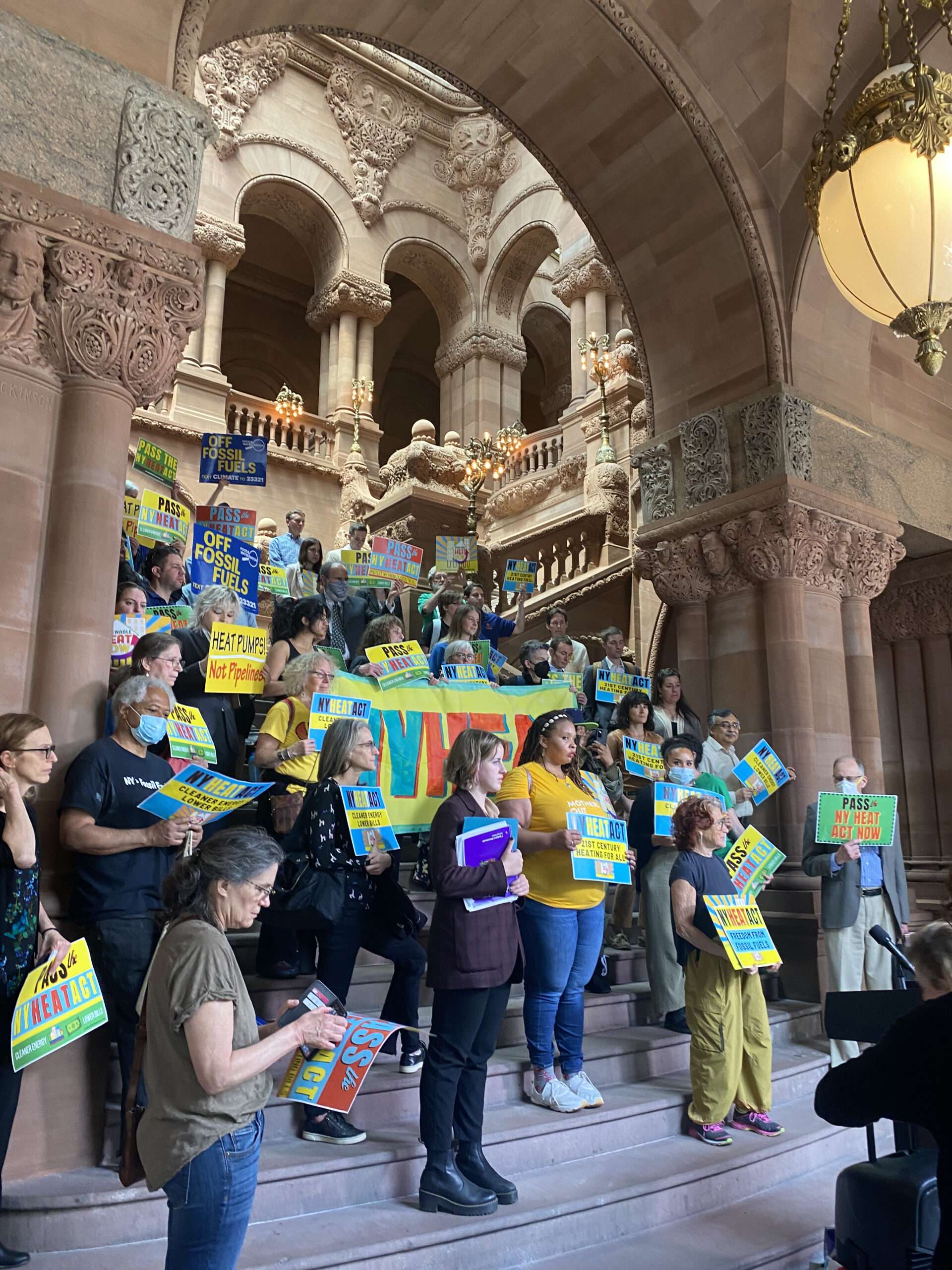
The rally on the steps of the Million Dollar Staircase at 12:30. Demonstrators heard from community leaders, co-sponsors of the NY Heat Act from the State Senate and Assembly – who then went straight to the meeting on the floor to voice their support – and Patricia Fahy and Liz Kreuger, the sponsors of the bill in the Assembly and Senate, respectively.
